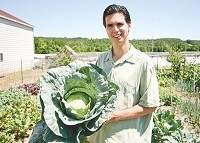From the beginning, Jere Gettle has been surrounded by the tradition of growing food.
“My parents and grandparents had always gardened, and so I just kind of grew up with it,” he says.
But while he had a healthy appreciation for food cultivation, Gettle was most interested in food’s humble beginnings: seeds.
He became enthralled by the sheer diversity of the tiny packages of life, and in particular, seed varieties that carry both ethnic and historical value, he says.
In 1998, when he was 17, Gettle founded Mansfield-based Baker Creek Heirloom Co., a purveyor of seeds that now has a catalog of roughly 1,400 types of seeds, with “everything from asparagus to zucchini,” he says.
Gettle says the Y2K scare, which predicted widespread computer problems at the millennium’s end, propelled interest in his seeds, growing his mailing list to 7,000 from 550.
At that time, he says, he offered only about 75 kinds of seeds.
By 2000, Gettle moved his business out of his parents home and built Baker Creek’s seed store. And the company has been growing ever since, posting revenues of $3 million in 2010.
Those funds come from millions of seed packets – at roughly $2 apiece – that are shipped each year, and Gettle says he anticipates hitting $3.5 million in revenues in 2011.
Gettle’s heirloom seeds, which come from about 125 growers, about half in Missouri, have been carefully maintained for decades, or even centuries. His seeds are a sharp contrast to a food market that is increasingly dominated by genetically modified crops, or GMOs, with patented genes from seed titans such as Monsanto and DuPont.
Gettle is among a group of “pure-foods” farmers and organic trade groups challenging in federal court the patents of Creve Coeur-based Monsanto.
The suit aims to prevent the company from suing farmers like Gettle who want to avoid using its genetically altered products.
Gettle credits the recession – which led many to try growing their own food – and public concern about GMOs, with much of his company’s growth.
Some demand comes from small growers, chefs, schools and gardens around the world, including Disneyland, Gettle says. He donates about 300,000 packets each year to nonprofits, mostly schools, and locally, he focuses on encouraging kids to be active and eat well.
With a staff that fluctuates seasonally from 40 to 100, Gettle says employment typically peaks during the first three months of the year as the company prepares for spring.
A small village has cropped up around the seed shop, including warehouses lined with plastic buckets full of seeds and a vegetarian restaurant.
The village is home to monthly festivals that draw 500 to 1,400 people, as well as a larger annual festival in the spring that draws about 5,000. The festivals bring together speakers, musicians, vendors and craft demonstrations.
Baker Creek also has locations in California and Connecticut and publishes a seasonal magazine, “Heirloom Gardener,” that’s delivered to roughly 7,000 subscribers.
The biggest event this year is a three-day exposition in California, with speakers from around the world. “We’re kind of keeping all the pieces together,” Gettle says. “Our goal is to have produce from all 50 states represented.”
From the 2011 Economic Impact Awards publication[[In-content Ad]]
